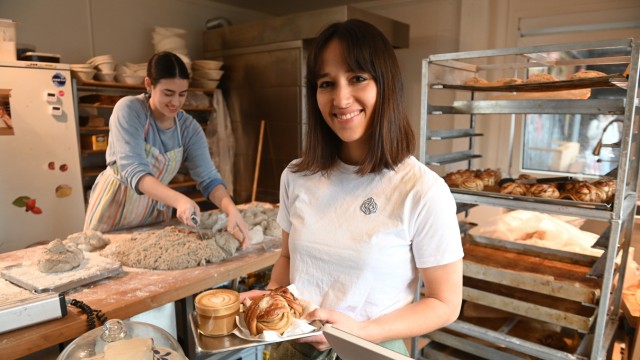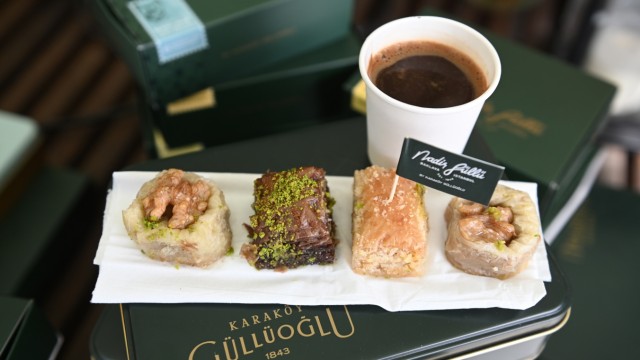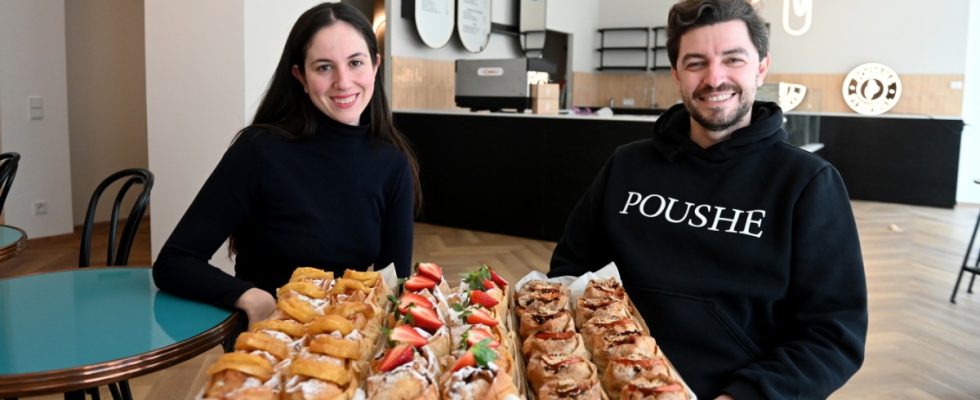At Easter, sweets are in demand, but does it always have to be chocolate eggs, chocolate bunnies, yeast dough Easter cakes or lamb batter dusted with powdered sugar? Variety is offered by handcrafted sweet specialties from other countries, which have recently become available in Munich.
Bulgarian strudel at Gärtnerplatz
Vania Naydenova and her family had already successfully run the “Poushe” café in Zurich for many years when they sold their homemade strudels under this name for the first time in Germany in 2014, namely at a street food festival on Munich’s Praterinsel. Since then, Naydenova has been clear that she wants to have a permanent Poushe location in Munich at some point. Nevertheless, in the years that followed, branches in Stuttgart, Augsburg and Regensburg followed, due to the high rental prices in Munich.
But after a first soft opening attempt last week, the time has now come at the beginning of April. Poushe opens the first café in Munich, at Klenzestraße 30 directly on Gärtnerplatz. Like all locations in Germany, it is run by Naydenova and her husband Florian Baumgartner. But there are actually four women behind the Poushe brand: Naydenova herself, her two sisters and their mother Ivanka Suter, who founded Poushe in 2001 and still looks after the mother ship in Zurich today.
The strudels are made according to a family recipe.
(Photo: Stephan Rumpf)
The focus of each Poushe Café is on the handmade strudels based on a family recipe. Naydenova’s grandparents in Bulgaria were already confectioners, and the basic ingredients of the strudel have remained the same to this day. The strudel dough is made with sunflower oil instead of butter and is therefore inherently vegan. Strudel and pastries are not necessarily typically Bulgarian, they are more Bohemian or Eastern European, explains Naydenova.
The sisters make the strudels themselves by hand near Stuttgart and deliver them to Munich. Changing production wasn’t easy, says Naydenova, because the wrapping technique for the strudels is complicated and a guarded family secret. Manufacturing employees even sign a non-disclosure agreement. The trick is to roll out the dough very thinly so that it becomes crispy on the outside when baked and the filling can be evenly distributed on the inside. This means that the Poushe Strudel doesn’t taste like a mighty pastry, but more like a juicy, crispy pastry.
The strudels are presented in the Munich café in a large display case at the self-service ordering counter. There are sweet and savory classics all year round, such as apple cinnamon (8.50 euros) or lentil curry (9.50 euros), as well as seasonal creations, for example strudel with strawberries or asparagus in spring. By the way, “Poushe” is pronounced “Puschä” with an emphasis on the second syllable, explains Naydenova. It is a dialect word from the region of Bulgaria where her family comes from and an expression for the small, sweet, warm, but also for the feeling when the family sits together.
Swedish cardamom knots in the studio park

Marie Herrmann presents Swedish cardamom knots in the “Bageri”, her bakery at the Thiel railway station attendant.
(Photo: Stephan Rumpf)
Marie Herrmann is more of a sourdough baker than a sugar baker, but she even adds her sourdough to her sweet cardamom knots (four euros). Last fall, she fulfilled her dream of having her own bakery with a small container in the studio park at the Thiel railway station attendant. It’s called “Bageri”, the Swedish term for “bakery”.
In Scandinavia, Herrmann not only got to know cardamom knots, which are a specialty there, but also bakeries that offer high-quality artisan pastries and good coffee at the same time. She wanted to bring this concept to Munich because she thinks it’s rare to get both in the same place here.
Herrmann is actually a trained pharmacist and acquired a special license through an examination from the Chamber of Crafts, which enabled her to set up her own bakery without a master’s degree. Her pharmacy studies helped her prepare for this exam, as there are definitely points of contact between the two professions. “The more patience you have when pulling things, the better they will eventually become. This applies equally to pharmaceutical technology and dough technology,” says Herrmann. She has been “growing” her sourdough for six years now.
No matter how cramped the bakery may be, for Herrmann the container is the ideal location, which she also believes she can afford financially as a self-employed career changer. At first she was just worried that the studio park wouldn’t attract enough walk-in customers. These concerns quickly disappeared. Meanwhile, on a Saturday in good weather, up to 600 knots went over the sales counter.
Herrmann first tried cardamom knots in Copenhagen and even studied how they were made up close at the legendary Swedish bakery Loshult Handelsbod when she helped out there for a few weeks. Her own recipe is based on a vegan sourdough with yeast based on oat milk, and freshly ground cardamom is definitely used in the filling. The strands of dough are then knotted differently depending on the type: cardamom looped smoothly, cinnamon twisted, poppy seed marzipan braided. There are also saffron notes on Maundy Thursday and Holy Saturday. Finally, a glaze made from cane sugar syrup and sea salt makes the knots shine and keeps them fresh for longer.
Turkish baklava at the Viktualienmarkt

Nadir Güllü’s pop-up stand on the Viktualienmarkt has to close on March 31st, but baklava sales will soon have a permanent location.
(Photo: Stephan Rumpf)
When Nadir Güllü’s pop-up stand from Istanbul opened at the Viktualienmarkt last fall, their baklava sold out within a few hours. “Resupplies were then flown in from Istanbul in suitcases,” remembers branch manager Baris Çelik with a laugh. The demand has not stopped since then. The pop-up, which was actually only supposed to last until the end of the year, was allowed to extend until March 31st.
But even now the farewell is not forever. Because it is now clear that Nadir Güllü will remain with a permanent location in Munich. Where exactly cannot be revealed because the contracts still have to be signed, says Çelik. He only reveals this much: you don’t have to move far away.
The new branch will not only remain the only one in Munich, but also the only one in Germany, explains Çelik. In addition to the production center in Istanbul, which is currently being built at Galataport and where two and a half tons of baklava are produced every day, there is only one other shop in Tokyo. Munich was chosen because baklava here has a reputation as an overly sweet “snack junk product,” says Çelik. They want to change that, because in Turkey baklava is a high-quality delicacy.
“Karakoy Gulluoglu Nadir Güllü” is a sixth-generation family business and their baklava is often described as the best in Turkey. At 0.1 millimeters, the dough is rolled out so thin that it couldn’t soak up sugar water, as Germans are used to with local baklava. Each baklava consists of 40 layers of dough and is filled with pistachios from Gaziantep. Because of such regional ingredients, it makes no sense to outsource production from Turkey, says Baris Çelik. In addition, the training of master bakers takes seven years.
In total, Nadir Güllü produces 27 different types of baklava. In addition to the light classic with pistachio, the pop-up’s range included a dark baklava with Belgian praline chocolate or a round one with walnut filling (3.50 euros each). Çelik promises that there will be more varieties in the new branch.

